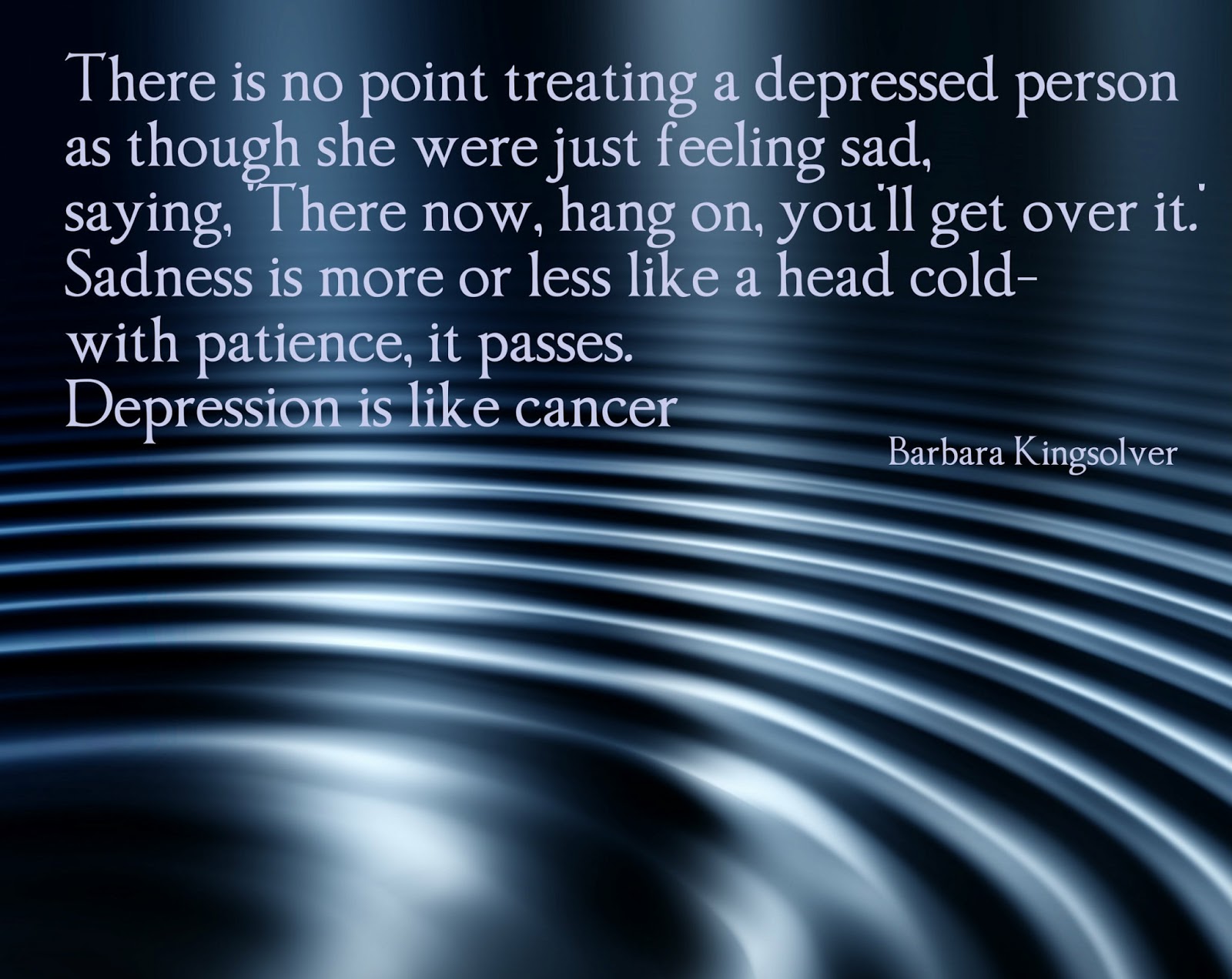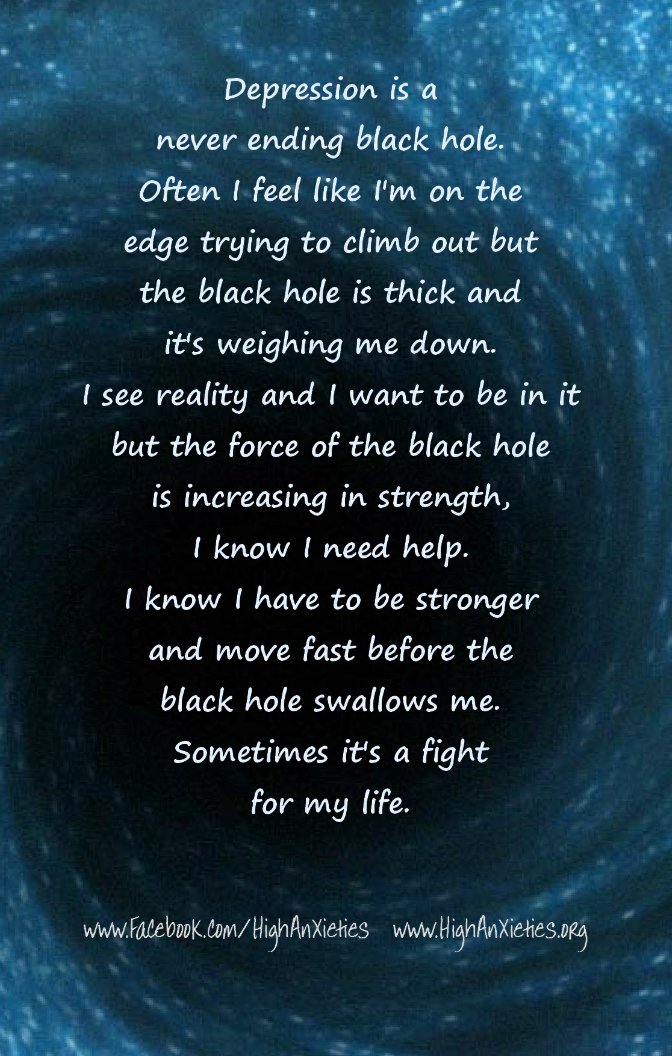April 29, 2013 -- Depression. It is a form of mental illness. It is something that affects our health in a way that is usually invisible to the people around us. At times, even family and friends may not be aware that someone close to them is suffering from this insidious disease. And it is a disease. To anyone who has experienced depression, or another form of mental illness, the pain and suffering they feel is as real as any serious illness caused by a virus or bacterial infection.
Many
factors contribute to the development of depression. An individual may
be genetically predisposed and his or her risk can be increased by
several external factors. These include: the death or illness of a
spouse, friend or family member; difficulties at work, school or with a
personal relationship; low self-esteem; financial difficulties; or
addictions.
Like
the flu or the common cold depression will affect a vast majority of
Canadians at some point in our lives. However, it is one of the few
"diseases" where the sufferers experience discrimination and are
stigmatized. Studies in Canada
and internationally have shown that attitudes and behaviour toward
people suffering from mental illness have barely budged in the past
decade. It is the only illness where many people expect the sufferers
to "get over it" or "suck it up" and act normally. In short, it is a
dirty word in our society and most people don't want to know when you
have it or that you are suffering from it.
Statistics
from various health studies say that at least 20% of Canadians will
suffer some form of mental illness in their lifetime. However, if
depression is included (the most common form of mental illness) then
that 20% would grow to include a substantial majority of Canadians. Despite the number of people that will suffer from depression or another mental disorder, the resources committed to fighting this disease pale in comparison to funds committed to research and treatment of other high profile diseases which affect a much smaller segment of the population.
Everyone who reads this has either experienced depression or they know someone who has. Despite numerous public education campaigns over the past decade and a large amount of research on the issue it still seems that Canadians are uncomfortable talking openly about depression or other mental health disorders or accepting those who suffer from them. And yet this is a health issue that is having a profound effect on our society.
Related:
* Let's Talk Campaign
* Centre for Addiction and Mental Health
Here are some statistics about mental health according to the Canadian Mental Health Association:
Related:
* Let's Talk Campaign
* Centre for Addiction and Mental Health
Here are some statistics about mental health according to the Canadian Mental Health Association:
- Mental illness affects everyone regardless of age, education, income or culture;
- 20% of Canadians will personally experience a mental illness in their lifetime;
- Approximately 8% of adults will experience major depression at some time in their lives;
- Anxiety disorders affect 5% of the household population;
- Almost 49% of those who feel they have suffered from depression or anxiety have never sought medical treatment;
- 10-20% of Canadian youth are affected by a mental illness or disorder;
- Suicide is one of the leading causes of death in both men and women from adolescence to middle age;
- Suicide accounts for 24% of all deaths among 15-24 year olds and 16% among 25-44 year olds;
- Canada’s youth suicide rate the third highest in the industrialized world;
- mental disorders in youth are ranked as the second highest hospital care expenditure in Canada;
- at least 500,000 employed Canadians are unable to work due to mental illness during any given week; and
- on a weekly basis approximately 175,000 full-time workers are absent from work due to mental health issues.
The research shows that depression and other mental illnesses seem to be pervasive in society. And, surprisingly, so is the stigma associated with them.
Stigma against people with mental illnesses can feel oppressive and alienating since it prevents many from seeking help. It denies them access to the support and treatment they need to recover. And those who live with mental illness often say that the stigma they encounter is worse than the disease itself.
The stigma associated with mental illness is so severe that less then 50% of Canadians would tell friends or coworkers that they have a family member who suffers from it, compared to 72% who would discuss a diagnoses of cancer with others, or 68% who would talk to others about diabetes in the family. Only 12% of Canadians said they would hire a lawyer, financial planner or family doctor if they knew he or she suffered from mental illness. And only 49% said they would socialize with a friend who had a mental illness. In addition, 46% of Canadians think people use the term "mental illness" as an excuse for bad behaviour; and 27% are fearful of being around people who suffer from serious mental illness because of the widely held misconception that the majority of them are prone to violence.
Related:
* Mass Media and Mental Illness
* The Role of the Media in Forming Attitudes Towards Mental Illness
* Stigma Matters
The economic costs of mental illness in Canada are also staggering. According to a 2012 study by the Conference Board of Canada, mental illnesses are costing the Canadian economy $20.7 billion and this is growing at a rate of approximately 1.9 per cent every year. However, this figure may be substantially higher. In a 2009 speech delivered by former Chief Economist of the TD Bank Don Drummond, he pegged the economic loss to Canada's economy from mental illness at $33 billion annually.
Related:
* The Cost of Mental Health and Substance Abuse Services in Canada
* Economic Costs of Mental Disorders
* Mental illness adversely affecting Canada’s economic potential
Whichever statistics you believe the economic impact of mental illness on society is huge. They paint a sombre picture about the issue and demonstrate that mental health disorders are affecting Canadians personally and economically at levels that would be called an epidemic if we were talking about something like the bird flu or a viral infection. And yet in this scenario the issue does not garner the on-going attention from politicians or the media that it deserves.
Despite all the negative aspects of depression and other mental disorders noted above the good news is that attitudes are changing as public education campaigns become more prevalent. Many celebrities are now attaching themselves to campaigns to educate and inform the public about depression and other mental health issues. One such person is Canadian Olympian Clara Hughes who is the national spokesperson for Bell Canada’s mental health initiative and the "Let’s Talk" campaign. By publicly sharing her personal struggles with depression she is helping to break down the stigma associated with mental illness. Another is Ottawa Senators captain Daniel Alfredsson who has been a leading voice on mental health issues through his association with the Royal Ottawa Foundation for Mental Health and their "You Know Who I Am" campaign which created awareness of the many complex issues surrounding mental health and the stigmas attached to it. Other international celebrities who have spoken out about personal battles with mental illness or participated in mental health education campaigns include: J.K. Rowling, author of the Harry Potter books; Oscar winning actress Catherine Zeta-Jones; and musician Elton John.
Notwithstanding all the hurdles facing people who experience depression, it is a condition that can be treated. And while treatment varies according to individual circumstances, the most effective treatment is likely to come from a combination of the following.
The stigma associated with mental illness is so severe that less then 50% of Canadians would tell friends or coworkers that they have a family member who suffers from it, compared to 72% who would discuss a diagnoses of cancer with others, or 68% who would talk to others about diabetes in the family. Only 12% of Canadians said they would hire a lawyer, financial planner or family doctor if they knew he or she suffered from mental illness. And only 49% said they would socialize with a friend who had a mental illness. In addition, 46% of Canadians think people use the term "mental illness" as an excuse for bad behaviour; and 27% are fearful of being around people who suffer from serious mental illness because of the widely held misconception that the majority of them are prone to violence.
Related:
* Mass Media and Mental Illness
* The Role of the Media in Forming Attitudes Towards Mental Illness
* Stigma Matters
The economic costs of mental illness in Canada are also staggering. According to a 2012 study by the Conference Board of Canada, mental illnesses are costing the Canadian economy $20.7 billion and this is growing at a rate of approximately 1.9 per cent every year. However, this figure may be substantially higher. In a 2009 speech delivered by former Chief Economist of the TD Bank Don Drummond, he pegged the economic loss to Canada's economy from mental illness at $33 billion annually.
Related:
* The Cost of Mental Health and Substance Abuse Services in Canada
* Economic Costs of Mental Disorders
* Mental illness adversely affecting Canada’s economic potential
Whichever statistics you believe the economic impact of mental illness on society is huge. They paint a sombre picture about the issue and demonstrate that mental health disorders are affecting Canadians personally and economically at levels that would be called an epidemic if we were talking about something like the bird flu or a viral infection. And yet in this scenario the issue does not garner the on-going attention from politicians or the media that it deserves.
Despite all the negative aspects of depression and other mental disorders noted above the good news is that attitudes are changing as public education campaigns become more prevalent. Many celebrities are now attaching themselves to campaigns to educate and inform the public about depression and other mental health issues. One such person is Canadian Olympian Clara Hughes who is the national spokesperson for Bell Canada’s mental health initiative and the "Let’s Talk" campaign. By publicly sharing her personal struggles with depression she is helping to break down the stigma associated with mental illness. Another is Ottawa Senators captain Daniel Alfredsson who has been a leading voice on mental health issues through his association with the Royal Ottawa Foundation for Mental Health and their "You Know Who I Am" campaign which created awareness of the many complex issues surrounding mental health and the stigmas attached to it. Other international celebrities who have spoken out about personal battles with mental illness or participated in mental health education campaigns include: J.K. Rowling, author of the Harry Potter books; Oscar winning actress Catherine Zeta-Jones; and musician Elton John.
Notwithstanding all the hurdles facing people who experience depression, it is a condition that can be treated. And while treatment varies according to individual circumstances, the most effective treatment is likely to come from a combination of the following.
The first step in the recovery process is to recognize that it is an illness, not a sign of personal weakness. Realizing and accepting that you are not alone and that help is available is often the start of recovery for many people.
Talk therapy and psychological counselling and support can provide significant relief by helping to identify what is the cause of problem and how to approach treatment. Support from family, friends and co-workers is also a key factor in treating depression since having an emotional support network lets the affected individual know that they are not alone in their struggle.
Symptomatic relief can also be achieved through various anti-depressant medications when taken under a doctor's care and combined with counselling.
Because substance abuse and addictive behaviours are also common among those experiencing depression twelve-step programs can also be very effective.
Combining all of these with lifestyle changes like physical activity, stress management techniques and getting regular sleep will go a long way toward helping to achieve relief.
Research clearly shows that depression and other mental disorders are on the rise and their impact on society is growing every year. That is the bad news. The good news is that public awareness about mental illness in Canada is higher then it has ever been. However, Canadians need to build on this awareness with concrete action.
If we as a society want to halt or reduce the social and economic impact of mental illness then more effort needs to be put into public awareness and education campaigns, and we need to remove the social stigma connected with it. In addition, more businesses and corporations need to get involved in addressing mental health issues in the workplace, if only because it will help to improve their bottom line. And finally, governments need to commit more resources to combat mental illness in the same way they have committed more resources to public security or combating terrorism. Because if they do then the gains in the long run will include a decreased demand on the health care system, fewer disability claims, a reduction in time off work and absenteeism, and increased productivity. In the end, not only will society benefit but so will we as individuals. It is a win-win-win situation and it is a "no-brainer."
© The View From Here. All rights reserved.



